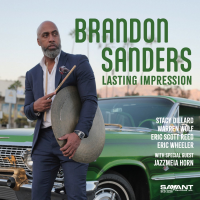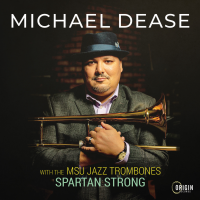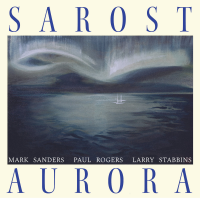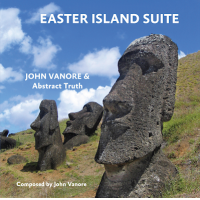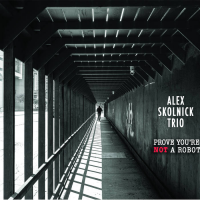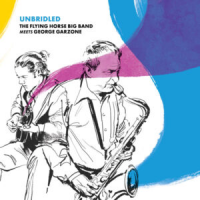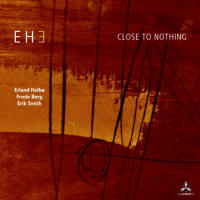Home » Jazz Articles » Extended Analysis » Wadada Leo Smith: Wadada Leo Smith: Ten Freedom Summers
Wadada Leo Smith: Wadada Leo Smith: Ten Freedom Summers
 Wadada Leo Smith
Wadada Leo SmithTen Freedom Summers
Cuneiform Records
2012
Trumpeter and composer Wadada Leo Smith's Ten Freedom Summers is four and a half hours of music, spread over four compact discs. The mind struggles to make coherent sense of so large an undertaking. Smith has said that there are no recurring musical motifs; the nineteen pieces—most of them fully-developed suites in their own right, three of them stretching over twenty minutes—stand on their own. Two groups—Smith's two-drummer Golden Quintet and the nine-piece ensemble Southwest Chamber Music led by Jeff von der Schmidt—perform, sometimes separately, sometimes together. Even by the standards of Smith's own heterogeneous and energetic creativity, it's in a class by itself.
As a work of sustained imagination and creation, Ten Freedom Summers has few parallels in the annals of jazz. Ostensibly it is a meditation on the Civil Rights Movement; the movements variously address Malcolm X, Dr. Martin Luther King Jr., Brown vs. Board of Education, Medgar Evers, the Little Rock Nine. The thematic concerns nevertheless extend beyond that already ambitious subject matter, both backwards (to the 1857 Dred Scott case) and forward (to 9/11), and to a series of cross-cutting concerns (e.g., democracy, the freedom of the press and the black church). In the work's October 2011 premiere performance in Los Angeles, the piece was spread over three evenings: "Defining Moments in America," "What is Democracy?" and "Ten Freedom Summers." It is thus an interwoven suite of three suites, each constituent part of which is a free-standing suite on its own. (One and two-thirds of the nineteen pieces have been recorded before by Smith: "America," parts I and II, and "Rosa Parks and the Montgomery Bus Boycott, 381 Days" on Tabligh, released in 2008 on Cuneiform.)
This is tough, challenging music. It will not particularly recall to mind the historically-inspired projects of trumpeter Wynton Marsalis nor the politically-charged mid-1960s work of drummer Max Roach: Ten Freedom Summers is more musically adventurous than either of those antecedents, as those familiar with Smith's work already know. Its closest cousin is clarinetist John Carter's five-album sequence Roots and Folklore: Episodes in the Development of American Folk Music (1982-89), both in terms of its historical breadth and music.
Saxophonist John Coltrane's musical conception, circa 1965, is a truer forerunner: breaking free from conventional harmonic practices, communicating complex emotion and deep spirituality. Another musical reference point is trumpeter Miles Davis, circa 1965. When Smith puts in the mute midway through "Democracy," the similarity with the earlier trumpeter's celebrated mid-'60s quintet is laid bare. That quintet's approach was summarized by its pianist Herbie Hancock as "time, no changes"—a propulsive tempo but floating free of any harmony or chord changes. Smith's pieces here with the Golden Quintet could be understood, in contrast, as "changes, no time." Soaring melodic and harmonic ideas creep, stride, dance, crawl, explode, insinuate, but almost never shuffle along to a regular beat.
To be sure, there are more broadly conventional musical elements, including the fairly funky blues in the middle part of the Thurgood Marshall/Brown vs. B.O.E. piece, and the lament that forms the core of the 9/11 memorial.
Drums, Smith's trumpet and pacing provide musical unity to this meta-suite. The first is not surprising for a quintet that features two drummers (Pheeroan akLaff and Susie Ibarra, both excellent throughout), ably supported by percussionist Lynn Vartan of the chamber ensemble, and despite the absence of a straightforward beat. In particular, during the segments marking capital-H historical moments—social movements, legislation, Supreme Court decisions and public speeches—stentorian drumbeats signal the moments' import.
Smith's trumpet, too, manages to be historical, but not only at the broad level; the trumpet also marks individual acts and choices that add up to the sweep of historical drama. At times, Smith sounds as though he's recorded at some distance from the microphone, a voice among a multitude, the link between the macro and micro scales wherein so much of the Civil Rights story lies.
Smith furthermore exploits the trumpet's proclivity to sound a battle cry. In the exquisite movement dedicated to Emmett Till (the fourteen-year-old boy brutally murdered in Mississippi in 1955 for having whistled at a white woman), Smith's trumpet is a wail, but measured, slow, an elegy that calls listeners to attention, and ultimately to action. This is the summons evoked by British poet Stephen Spender in "The Generous Years," thinking back to the Spanish Civil War, sounded by "the trumpet / Behind the sun that sends its thinning ray / Penetrating to the marrow." That's what Smith's trumpet does.
"Emmett Till," like the larger whole of which it is a part, moves deliberately, but slowly. The struggle is built upon patience, collective action, a thousand acts, and it takes a long time. The Montgomery bus boycott lasted 381 days—Smith's title includes its duration to remind us.
In Ten Freedom Summers's Los Angeles premiere, the music was accompanied by historical video and sound recordings related to the events the piece narrates; music of this emotional depth would surely be charged by that kind of multi-media presentation. In the absence of explicit narrative milestones, the music must rely upon other means to tell its story.
In this regard, an excellent and far-reaching early-2011 AAJ interview with Franz A. Matzner provides invaluable insights. Asked by Matzner how he translates an individual's historical experience into art, Smith explains:
It is still the psychological part. The basic reality of the human being is that if you can tap into the psychological reality of the decisions they made than you are into something... For example, Fanny Lou Hamer, who was considered an uneducated woman, never gone through more than 2-3 grades in school, worked as a plantation worker, a sharecropper who really lived in a slave system where you work all year and the money that you get for that year pays of the debt that you lived off of. Which means the next year you have to start all over because you don't have any money to go forward. How could a woman like that realize in an instant that human rights was an important issue? That she should dedicate her life to [it] and that voting is part of her civil liberties that she should partake in? So she signed up to vote and came back home and her plantation owner came to her house the next day and said, "look you go down there and un-vote or you leave my plantation." She and her husband packed their bags and left! Without anywhere to go!
Now what that does, that brings tears to me. That makes my heart open with a river of joy. Because that says that woman understood something about the human experience that most people never, ever get to in a full life.
In light of this, how does "Fannie Lou Hamer and the Mississippi Freedom Democratic Party, 1964" sound? The piece is confusing at first; the quintet elements do not cohere around a single theme or melody the way they do in the more macro-historical pieces. Hamer is not standing above history but is a player within it, not seeing the entire sweep. She is whirled about by those historical forces—a quiet, arco bass, a swirling piano—in a way that is hard for her to comprehend. The searing, stabbing trumpet phrases may not directly cite or refer to other parts of Ten Freedom Summers, but at a meta-musical level it is the same "thinning ray" of the "trumpet behind the sun," the same coming into focus of a set of intersecting phenomena—racism, poverty, justice, change—electrified by a single woman's choice to act. As the piece closes, the music is worried, struggling, pulled forward by a little three-note piano figure. Its coda is definitive—a sustained trumpet note—but inconclusive, unresolved.
Among the pieces that, thematically, sit above the historical timeline, "Democracy" is especially noteworthy. It is an excellent example of that oft-claimed affinity between jazz and democracy. Both, so they say, require common adherence to a few ground rules, celebrate individual excellence, and achieve collective results beyond the reach of the individual. That account applies particularly well to a tightly controlled performance like Count Basie's "One O'Clock Jump." As an account of the considerably freer "Democracy" led by Smith, however, the focus is not on the fruits of democracy, but the process itself—cacophonic, loud-then-soft, a diversity of voices clamoring for attention, indisputably engaging. "Democracy" is a sophisticated conceit, and it makes clear just why it makes sense for a jazz musician to be telling this story.
Ten Freedom Summers ends in the middle, like a chronologically jumbled Roberto Bolaño novel. But as with a Bolaño novel, the closing, twenty-minute "Martin Luther King, Jr.: Memphis, The Prophecy" is not just any event, but rather a critical inflection point in the larger narrative: it's Dr. King's April 3, 1968 speech in Memphis, on the eve of his assassination. Its thrilling final minutes—Dr. King's last public words—contain the prophecy to which Smith's title refers, and bear repeating:
We've got some difficult days ahead. But it doesn't really matter with me now. Because I've been to the mountaintop... I just want to do God's will. And He's allowed me to go up to the mountain. And I've looked over. And I've seen the Promised Land. I may not get there with you. But I want you to know tonight, that we, as a people, will get to the Promised Land. So I'm happy, tonight. I'm not worried about anything. I'm not fearing any man. Mine eyes have seen the glory of the coming of the Lord.(Watch the full speech here.)
Dr. King's words, and Smith's trumpet, capture "the trumpet scarlet blaze / The lightning in the bones these generous days," to cite another part of Stephen Spender's poem. Smith's composition does not seek to match the thunderous excitement of King's speech. Instead, he relies on the elements commented above: percussion to mark history, the "trumpet behind the sun," and the slow and deliberate pace. A repeated five-beat alternation of two notes builds suspense, informed by our foreknowledge of the violence that lay in wait for Dr. King (and by his eerie prescience: " Like anybody, I would like to live a long life; longevity has its place," he says, near the end. "But I'm not concerned about that now.") Meanwhile the "trumpet scarlet blaze," first heard in "Emmett Till," warm and regal, but pained and singing the blues, links the event to what went before and what would follow. The writing for the harp introduces a quiet intimacy. Like "Fannie Lou Hamer," it's the intersection of the sweep of social change and the individual act.
This is the sound of Smith's "heart opening with a river of joy"—his heart, and ours.
CD1: Dred Scott, 1857; Malik Al Shabazz and the People of the Shahada; Emmett Till: Defiant, Fearless; Thurgood Marshall and Brown Vs. Board of Education: A Dream of Equal Education, 1954; John F. Kennedy's New Frontier And The Space Age, 1960. CD2: Rosa Parks and the Montgomery Bus Boycott, 381 Days; Black Church; Freedom Summer: Voter Registration, Acts Of Compassion and Empowerment, 1964; Lyndon B. Johnson's Great Society and the Civil Rights Act of 1964. CD3: The Freedom Riders Ride; Medgar Evers: A Love-Voice of a Thousand Years' Journey for Liberty and Justice; The D.C. Wall: A War Memorial for All Times; Buzzsaw: The Myth of a Free Press; The Little Rock Nine: A Force for Desegregation in Education, 1957. CD4: America, Pts. 1, 2 & 3; September 11th, 2001: A Memorial; Fannie Lou Hamer and the Mississippi Freedom Democratic Party, 1964; Democracy; Martin Luther King, Jr.: Memphis, The Prophecy.
Personnel: Wadada Leo Smith: composer, trumpet; Anthony Davis: piano; John Lindberg: bass; Pheeroan akLaff: drums; Susie Ibarra: drums; Alison Bjorkedal: harp; Jim Foschia: clarinet; Lorenz Gamma: violin; Peter Jacobson: cello; Larry Kaplan: flute; Jan Karlin: viola; Tom Peters: bass; Lynn Vartan: percussion; Shalini Vijayan: violin.
Track Listing
CD1: Dred Scott, 1857; Malik Al Shabazz and the People of the Shahada; Emmett Till: Defiant, Fearless; Thurgood Marshall and Brown Vs. Board of Education: A Dream of Equal Education, 1954; John F. Kennedy's New Frontier And The Space Age, 1960. CD2: Rosa Parks and the Montgomery Bus Boycott, 381 Days; Black Church; Freedom Summer: Voter Registration, Acts Of Compassion and Empowerment, 1964; Lyndon B. Johnson's Great Society and the Civil Rights Act of 1964. CD3: The Freedom Riders Ride; Medgar Evers: A Love-Voice of a Thousand Years' Journey for Liberty and Justice; The D.C. Wall: A War Memorial for All Times; Buzzsaw: The Myth of a Free Press; The Little Rock Nine: A Force for Desegregation in Education, 1957. CD4: America, Pts. 1, 2 & 3; September 11th, 2001: A Memorial; Fannie Lou Hamer and the Mississippi Freedom Democratic Party, 1964; Democracy; Martin Luther King, Jr.: Memphis, The Prophecy.
Personnel
Wadada Leo Smith
trumpetGolden Quartet/Quintet: Wadada Leo Smith: composer, trumpet; Anthony Davis: piano; John Lindberg: bass; Pheeroan akLaff: drums; Susie Ibarra: drums. Southwest Chamber Music: Jeff von der Schmidt: conductor; Alison Bjorkedal: harp; Jim Foschia: clarinet; Lorenz Gamma: violin; Peter Jacobson: cello; Larry Kaplan: flute; Jan Karlin: viola; Tom Peters: bass; Lynn Vartan: percussion; Shalini Vijayan: violin.
Album information
Title: Ten Freedom Summers | Year Released: 2012 | Record Label: Cuneiform Records
Tags
PREVIOUS / NEXT
Support All About Jazz
 All About Jazz has been a pillar of jazz since 1995, championing it as an art form and, more importantly, supporting the musicians who make it. Our enduring commitment has made "AAJ" one of the most culturally important websites of its kind, read by hundreds of thousands of fans, musicians and industry figures every month.
All About Jazz has been a pillar of jazz since 1995, championing it as an art form and, more importantly, supporting the musicians who make it. Our enduring commitment has made "AAJ" one of the most culturally important websites of its kind, read by hundreds of thousands of fans, musicians and industry figures every month.









